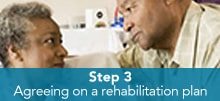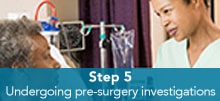
Knee Replacement Surgery: A Guide
Knee pain can make everyday activities tough. When treatments like physical therapy don’t work, knee replacement surgery might be an
Delivering unparalleled experience
beyond the Indian frontiers

Delivering unparalleled experience
beyond the Indian frontiers

We recommend all our patients to plan their hospitalization in advance to have a comfortable stay and smoother treatment process. This is even more crucial for our international patients travelling here to seek medical care. Our International Patients Services Desk will notify you of the admission date and inform you about the time and other aspects of our designated hospital. Our specialists may also schedule medical tests depending upon your condition, which will be performed prior to your admission. We have interpreters for several languages including Arabic, Nigerian, Japanese, Cantonese, and Mandarin, available on prior request. We can also provide interpreters in sign language. Proper planning can be a key differentiator in the outcome of your hospital stay. Here’s a list of what you need to do :

Your planning must involve securing financial avenues to pay for the trip and the procedures, including insurance settlements. For a better understanding of the required procedures speak to your doctor and get more clarity before starting your journey with us.
Your right as a patient of a hospital are as follows:
The time at the hospital is used for receiving treatment, resting, and recuperating but most of the time patients and caregivers focus only on the treatment aspect and then discharge. Although treatment is a major part of the hospital journey, which includes clinical, investigative and may be small procedure or major surgery – rest and recovery is also important. There should be sufficient rest given to patients for best treatment results.
We encourage you to bring one caregiver who is a close relative or family member or a personal friend at all times because we believe emotional support and well-being are equally important to a person’s recovery. Visitors must keep in mind the patient rights and their own responsibilities while visiting. But during intensive care or undergoing critical procedure we discourage visitors to visit for the benefit of the patient.
The admission procedure is very brief and completely “hassle-free”. The patient and their family will be briefly explained on the stay and treatment in the hospital. The patient’s relative then fills up the ‘Consent Form’ for admission, while the patient is administered necessary medical treatment.






For International patients most of the surgeries are elective procedures giving them sufficient time to plan and prepare. A surgical intervention is often necessary to help a patient overcome sickness and resume normal activities. We advise our international patients to plan theirs in advance to have a comfortable stay. Preparation of surgery involves the following,
A patient should be prepared to undergo an elective surgery by having a thorough discussion with doctors, counsellors and staff to aid this process of preparation. Sometimes the consent and approval of the immediate family is also necessary.

The need for surgical intervention differs from case-to-case. However, in most cases the fundamental principle is that the condition requires excision, suturing, grafting, bypassing, and other such procedures – which constitute a surgery. Doctors will only opt for a surgical intervention if it quickens the recovery, improves the chances of recovery and helps the patient to have a better chance of overcoming the disease.
You will have a thorough conversation on the need and process of the surgery with the surgeon performing the surgery. Every surgery will have a specialist surgeon who heads the operation, assisted by a team of specialized nurses, paramedics, and other specialists. An anaesthetist will monitor your conscious levels and administer necessary pain medication.
On the day of the surgery a patient is moved to a preoperative area and prepped for surgery. This includes changing into sterile surgical robes, intubation (if necessary), and final investigations. Patients may be asked to refrain from consuming food from midnight on the day of the surgery. Any other precautions will be communicated well-ahead of time.
Unexpected changes in the surgical schedule may happen sometimes. This may lead to change in your surgery timing on the day of surgery. Your family members, friends will be asked to wait in the surgical waiting room or the hospital lobby during your surgery. After being shifted in the operating room by the nurse, several monitors will be applied to monitor heart rate and rhythm. Three small sticky patches would be placed on your chest and an automatic blood pressure cuff will be placed on the arm.
Things to Remember Before Surgery
On the nature of surgery, patient’s condition and the recovery options post-surgery, the pain-relievers and anaesthesia are decided, which will be informed to the patients and caregivers for their consent. General anaesthesia is preferred for critical surgeries while for localized procedures, local anaesthesia is preferred. For surgeries wherein a larger area is operated then spinal anaesthesia will be given.
Typically, an overnight stay in the post-surgical intensive care allows a patient to recover sufficiently from the surgery. With anaesthesia waning the patient may experience mild grogginess, pain etc. This is completely normal.
Following surgery, you will be taken to a recovery room where you will receive continuous care by a trained nurse. Your vital signs will be regularly monitored along with any dressing t
an overnight stay in the post-surgical intensive care allows a patient to recover sufficiently from the surgery. With anaesthesia waning the patient may experience mild grogginess, pain, etc. This is completely normal.
Following surgery, you will be taken to a recovery room where you will receive continuous care by a trained nurse. Your vital signs will be regularly monitored along with any dressing that was applied after surgery. You may experience dry mouth, sore throat, chills, and blurred vision. If you experience pain or discomfort in the area of your surgery, do not hesitate to ask for pain medication. Be sure to report your pain. Doctors will monitor the vitals and move the patient to an intensive care, normal ward or room as necessary.
Your family members/friends should be in the waiting room before the end of your surgery time so that the surgeon can speak to them. If they need to leave, it is best to do so at the beginning of your surgery to avoid missing the surgeon at the completion of your surgery. Your surgeon will let your family/friends know how you are doing and answer questions, letting them know whether you require hospitalization or whether you will be discharged home.
hat was applied after surgery. You may experience dry mouth, a sore throat, chills and blurred vision. If you experience pain or discomfort in the area of your surgery, do not hesitate to ask for pain medication. Be sure to report your pain. Doctors will monitor the vitals and move the patient to an intensive care, normal ward or room as necessary.
Your family members/friends should be in the waiting room before the end of your surgery time so that the surgeon can speak to them. If they need to leave, it is best to do so at the beginning of your surgery to avoid missing the surgeon at the completion of your surgery. Your surgeon will let your family/friend know how you are doing and answer questions, letting them know whether you require hospitalization or whether you will be discharged home.






A consultation with our panel of doctors, specialists and surgeons will help you determine what kind of services you may need to help diagnose and treat your condition. If you or someone in your family or friend’s circle are facing any health issues, please get in touch with us, we are here for you.

Knee pain can make everyday activities tough. When treatments like physical therapy don’t work, knee replacement surgery might be an

One of the main organs in the body is the heart, which is impacted by cardiac illnesses. The most prevalent

Gallbladder removal, also known as cholecystectomy, is a popular surgical treatment used to treat gallstones and other gallbladder-related conditions. While

Otolaryngologist, a specialist for Ear, Nose, and Throat disorders. Otolaryngologist is a medical professional who diagnoses and treats problems that

Medical technological advancements have changed surgical procedures, providing patients and doctors with a safer and less intrusive option: laparoscopic surgery.

Individuals with failing kidneys undergo dialysis as a treatment. Through dialysis, waste and extra fluid from the blood are removed.